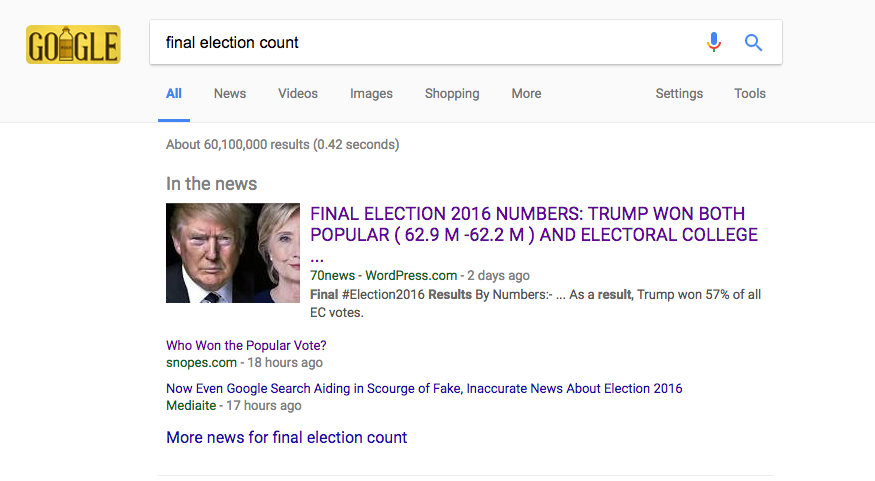Google has been criticized for letting fake news sites appear as the first search result on the “In the news” module, which bypasses Google News’ filtering.
The issue was made apparent when searching for “final election count” on Google would show a WordPress blog named 70news, assuring that Trump had won both popular and electoral college votes, which is false. In contrast, news that appear on Google News are filtered by company editors. Many believed that Google’s search modules worked in a similar fashion, but the 70news incident proved otherwise.

Google and Facebook cannot handle the truth
It seems that Google search results are not filtered for authenticity or quality content, even if the algorithm can oversee most fake news sites whose content is based on spam. The latest flaw is a clue revealing that Google’s search engine is far from perfect since user traffic is still the factor on which they rely to improve search results, contrary to the content of the page itself.
In essence, what a web administrator could do is to generate an enormous amount of inorganic traffic to their news site to make it appear on top search results.

“From our perspective, there should just be no situation where fake news gets distributed, so we are all for doing better here,” stated Google CEO Sundar Pichai.
The main problem is that neither Google or Facebook can assume what is news and what is not. Coverage of an event or about something that a person has said is usually provided by a person whose journalistic credentials show that they are capable for the job. Bias is basically always present when dealing with news coverage, but for the current state of affairs with social media and search engines, the current leaders in the field must rely on numbers rather than facts to distribute content.
Because Facebook and Google rely on how many users visit a page that can be considered to be “trending,” the page is put forward on search results and as feed suggestions, even if the content is false. Based on the recent flaw of the “In the news” module, Facebook and Google believe in the mantra “If everyone says it’s true, then it’s true.”
Both Facebook and Google have been reported to hire content moderators who filter search results and determine which sites are truthful and which aren’t. But even Facebook faced scrutiny during the elections because some of its news moderators categorized right-wing websites as spam, while in reality, they are as entitled to publish their radical views as anyone else on the internet.
The election allowed for the debate of ideas to test itself on social media, which is boosted by news sites and search engine optimization, proving that websites always want to generate more traffic.
One could argue that, just like Donald Trump during his presidential campaign, some news sites do not care if what they say is true, since their only purpose is to win, or in other words, appear as the first result in every user’s Google search. Until Google and Facebook develop better artificial intelligence to sort out news-based content, these pages cannot be fully reliable as a source of news, but in reality, it is the reader who must inform itself about what to believe about a news site.
